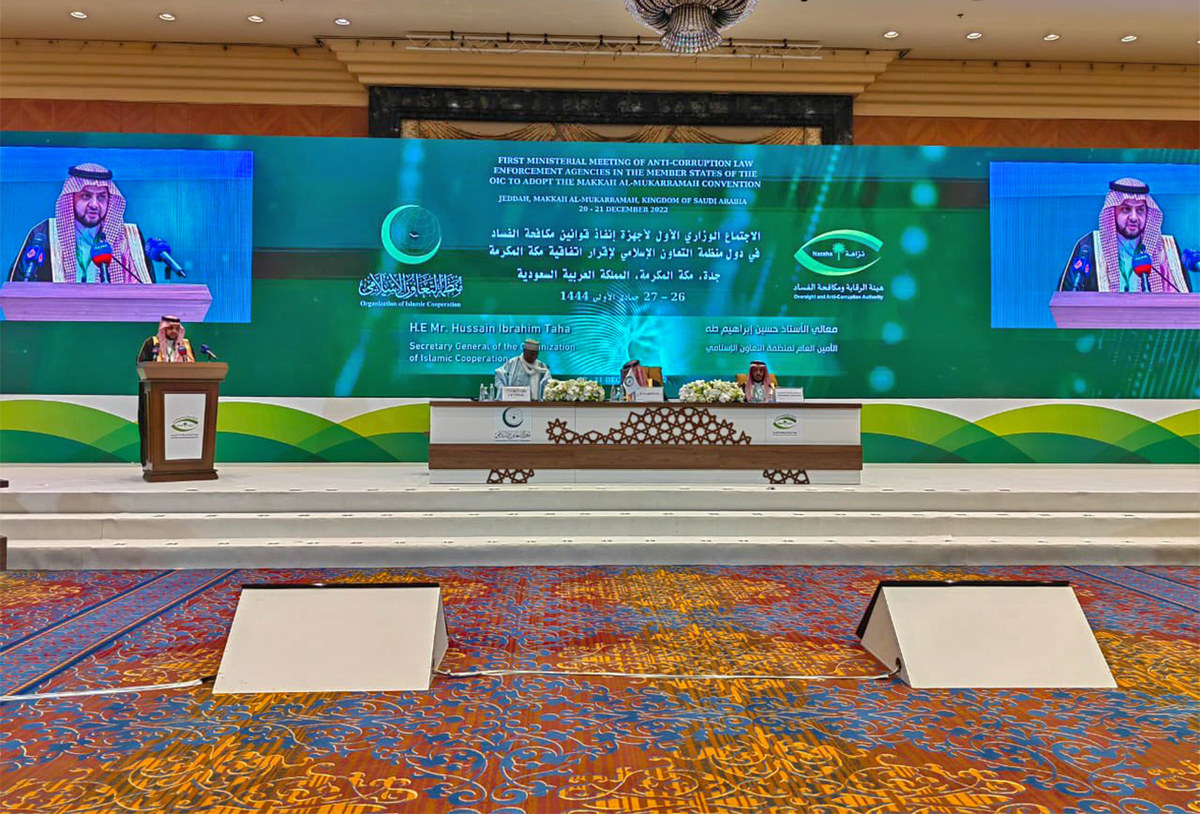ISLAMABAD: Pakistani law minister Azam Nazeer Tarar this week called for improving collaboration between Organization of Islamic Cooperation (OIC) member states as Saudi Arabia hosts the first ministerial meeting of anti-corruption law enforcement agencies to adopt the Makkah Al-Mukarrammah Convention, Pakistan’s state-run APP reported.
The Makkah Al-Mukarramah Convention is based on a resolution passed by the Council of OIC Foreign Ministers held in Islamabad last March which decided that a ministerial meeting would be held to prepare a draft agreement to combat corruption.
As chair of the Council of Foreign Ministers, Pakistan has played a leading role in the finalization of the draft of the Convention.
During meetings on December 20-21, at the top of the agenda were discussions on a draft of the Makkah Al-Mukarramah Convention for anti-corruption law enforcement within OIC member states. The issue of combating corruption is one of the essential pillars of Saudi Arabia’s vision 2030.
While delivering Pakistan’s statement earlier this week, Law Minister Tarar appreciated the leadership of Saudi Arabia for taking initiative on the Convention.
“He highlighted that Convention would further strengthen cooperation among Law Enforcement Authorities of OIC Member States&help in identification of problems and sharing of the best practices to address the menace of corruption,” Pakistan’s permanent mission to the OIC said.
“He urged Member States to deny financial safe havens to criminals&take initiatives to remove all barriers for recovery and repatriation of stolen asset to countries of origin. He hoped that the Convention would pave the way for improving collaboration among the OIC Member States and facilitate in return of proceeds of crime.”

The picture shows the first ministerial meeting of anti-corruption law enforcement agencies hosted by Saudi Arabia to adopt the Makkah Al-Mukarrammah Convention in Jeddah on December 20, 2022. (@PakOIC_Jeddah/Twitter)
In his speech, the president of the Oversight and Anti-Corruption Authority (Nazaha) of Saudi Arabia, Mazen bin Ibrahim Al-Kahmous, affirmed Riyadh’s support for efforts to combat corruption at the local and international levels.
“The ‘Makkah Al-Mukarramah Convention’ represents the most appropriate framework for preventing and combating corruption in the OIC member states through effective mechanisms for prevention, law enforcement, international cooperation, and asset recovery,” OIC secretary general Hissein Brahim Taha said, adding that OIC member states needed “legal mechanisms to promote the principles of transparency and integrity to establish the foundations of good governance.”
Secretary General of the International Criminal Police Organization, Jürgen Stock, said INTERPOL was cooperating closely with Saudi Arabia through its Riyadh Anti-corruption Initiative, and called for more “exchange of information” on combating corruption between OIC countries and the international policing organization.
The Executive Director of the United Nations Office on Drugs and Crime, Ghada Wali, praised the initiative of the OIC to hold the meeting, saying it represented “an important step to strengthen the international framework of combating corruption.”
Wali said corruption had become an existential challenge and cost the world huge amounts of money, also reducing the ability of countries to provide public services.
“For example, the United Nations Development Program estimates that corruption causes public project contracts to lose about 10 percent of their value worldwide,” Wali said, “the equivalent to $1.3 trillion annually.”



















